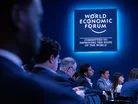Davos 2025: WEF's Summit a ClimateTech Beacon for the Future

Every January, the Swiss Alps town of Davos transforms from a quiet resort into the beating heart of global diplomacy and decision-making.
The World Economic Forum (WEF), which kicks off its annual meet there, draws a global mix of leaders from states, corporates, academia and the press, focusing deeply on sustainability.From its humble beginnings in 1971, the WEF has grown into a powerhouse, influencing international policy and fostering worldwide partnerships.
As we look towards the upcoming summit on 20 January, 2025, ClimateTech Digital offers insights into the event's crucial role in the eco-centric calendar.
The birth of Davos and the WEF's mission
The forum was founded on 24 January, 1971 by German economist Klaus Schwab.
It initially served as a managerial platform for European firms but soon expanded, drawing global participants to debate not just business but also pressing issues like geopolitics, tech advances and environmental changes.
Its location, tucked away in the mountains, symbolises the WEF's preference for serene settings, away from city bustle, perfect for discussions that shape the future.
Davos: A catalyst for cco-innovation
In recent years, sustainability has topped the agenda at Davos, taking cues from pressing global issues like climate change, biodiversity threats and socio-economic divides.
The summit has consistently echoed the UN's Sustainable Development Goals, integrating concepts like the green energy shift, circular economies and net-zero targets into mainstream dialogue.
Davos has been pivotal in driving major eco-initiatives, from the Paris Agreement to boosts in renewable tech and ethical investment.
As an innovation hub, the summit showcases breakthroughs in AI, green tech and sustainable farming, effectively bridging scientific prowess with policymaking.
The 2025 summit
At the 2025 summit, the WEF aims to address a convergence of crises with newfound intensity.
This year, under the theme Resilience and Renewal: Pathways to a Sustainable Future, the focus is sharp on carbon reduction, water security and fair resource distribution.
It marks a pivotal moment in Davos history.
Notably, this year amplifies younger, grassroots voices — a shift from the usual high-level exclusivity. The forum is embracing insights from indigenous populations, young social entrepreneurs, and sub-30 climate campaigners, highlighting a more inclusive approach to global problem-solving.
Davos scrutiny
Despite its clout, the WEF isn't shielded from critique.
Its exclusivity and top-heavy participant list draw criticism.
Professor Jan Aart Scholte from Leiden University says: “It is an exclusive invitation-only club and meaningful participation is mainly limited to the world’s more powerful governments, corporations and civil society actors.
"Moreover, when excluded people disagree with or feel harmed by WEF activities, they generally lack adequate channels to be heard and pursue redress.”Accusations of greenwashing, particularly among fossil fuel corporates, are present, too. However, energy industry leaders like Ignacio Galán, Chairman of Iberdrola, assert the forum's unique position in fostering dialogues that bridge divergent sectors towards a sustainable transition.
He says: "The opportunities presented by the transition are enormous, but it is vital that both business and policy makers focus now on ensuring that people have the right skills and training.
"Without skilled workers, the transition will not be achieved and the benefits will be non-existent."
The future of sustainability events
As Davos 2025 approaches, it promises to be a litmus test for global commitment to environmental and economic resilience.
"The question is no longer if we can achieve a clean energy future but how we address the financial, structural and regional barriers to do so," says Christian Bruch, President and CEO of Siemens Energy.
"The success of the global energy transition hinges on our ability to bridge financing gaps and tailor solutions to diverse regional realities. The challenges are immense, but so are the opportunities."
While views on its efficacy vary, Davos undeniably remains a critical barometer and catalyst for international policy and innovation.
As a hub for world-shaping discussions, its impact on the trajectory of global affairs continues one conversation at a time.
Make sure you check out the latest industry news and insights at ClimateTech Digital and be part of the conversation at our global conference series, Sustainability LIVE.
Discover all our upcoming events and secure your tickets today. Subscribe to the ClimateTech Digital newsletter.
ClimateTech Digital is a BizClik brand




